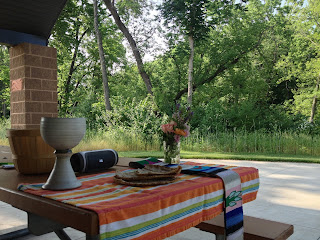“If I speak with human eloquence and angelic ecstasy but don’t love, I’m nothing but the creaking of a rusty gate. If I speak God’s Word with power, revealing all his mysteries and making everything plain as day, and if I have faith that says to a mountain, “Jump,” and it jumps, but I don’t love, I’m nothing. If I give everything I own to the poor and even go to the stake to be burned as a martyr, but I don’t love, I’ve gotten nowhere. So, no matter what I say, what I believe, and what I do, I’m bankrupt without love.”
Mahatma Gandhi was of a like mind saying, “It is easy enough to be friendly to one's friends. But to befriend the one who regards himself as your enemy is the quintessence of true religion. The other is mere business.”
Compassion is not, however, myself, or you, feeling sorry for someone else. It’s not an us and them proposition. It is we. Pema Chödrön remarked that “Compassion is not a relationship between the healer and the wounded. It's a relationship between equals. Only when we know our own darkness well can we be present with the darkness of others. Compassion becomes real when we recognize our shared humanity.”
To be compassionate, to experience compassion, is a simple act of holiness. It is a simple act of holiness that can transform the world into the kingdom of God. The very kingdom of God that Jesus said is at hand. The moment is now. To practice compassion means that we are engaging in the ongoing creation of life and choosing the path of love we were intended to live right now.
To enter into a relationship with others and intentionally try to understand and love them is not an easy path however. Henri Nouwen warned not to “underestimate how hard it is to be compassionate. Compassion is hard because it requires the inner disposition to go with others to the place where they are weak, vulnerable, lonely, and broken. But this is not our spontaneous response to suffering. What we desire most is to do away with suffering by fleeing from it or finding a quick cure for it.”
Nouwen observed that “Compassion asks us to go where it hurts, to enter into the places of pain, to share in brokenness, fear, confusion, and anguish. Compassion challenges us to cry out with those in misery, to mourn with those who are lonely, to weep with those in tears. Compassion requires us to be weak with the weak, vulnerable with the vulnerable, and powerless with the powerless. Compassion means full immersion in the condition of being human.”
What does it mean to live a life of compassion: As Matthew relates Jesus telling the story it means we will be interacting with God and achieving our full potential:
“Then the King will say to those on his right, ‘Come, you who are blessed by my Father; take your inheritance, the kingdom prepared for you since the creation of the world. For I was hungry and you gave me something to eat, I was thirsty and you gave me something to drink, I was a stranger and you invited me in, I needed clothes and you clothed me, I was sick and you looked after me, I was in prison and you came to visit me.’
“Then the righteous will answer him, ‘Lord, when did we see you hungry and feed you, or thirsty and give you something to drink? When did we see you a stranger and invite you in, or needing clothes and clothe you? When did we see you sick or in prison and go to visit you?’
“The King will reply, ‘Truly I tell you, whatever you did for one of the least of these brothers and sisters of mine, you did for me.’”
We are all intimately connected to each other by a power greater than all of us, our connection to that power and to one another is grounded in love and compassion. Practicing compassion causes that sacred synapse to energize our moments bringing a sense of perspective, meaning and purpose to our lives.
Consider this thought as you walk, run, or simply sit and meditate: “How would your life be different if you stopped making negative judgmental assumptions about people you encounter? What if you look for the good in everyone you meet. Not only looking for the good but looking for the holy in each person and respecting their journey. What if you respond to everyone with compassion?
Worship on the Journey is a short outdoor worship followed by a mindful run or walk. It is a ministry of Journey Church in Coralville, Iowa.


No comments:
Post a Comment